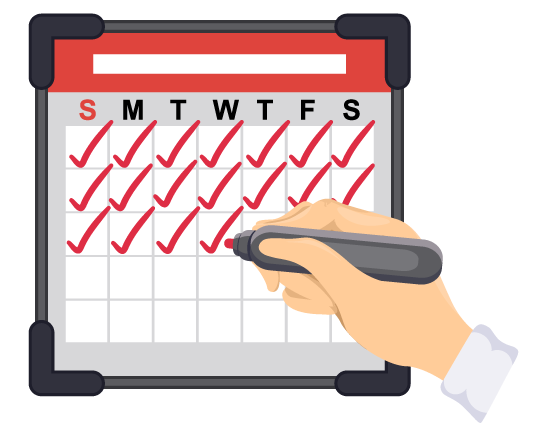This is lesson 6 of the free English course.
Previous lessons: lesson 1 | lesson 2 | lesson 3 | lesson 4 | lesson 5
What’s preventing you from improving your English?
I once asked my students that question. Here are some of the responses:
- I can’t practice regularly.
- How can I consistent? I start , but I can’t continue. Tell me something that I can oblige myself in practicing.
- I THINK THE “Procrastination” WILL PREVENTING ME FROM ACCOMPLISHING THE GOAL.
Do you find it difficult to be consistent?
Do you often start, stop, and start again?
If yes, let me share 3 tips for overcoming that problem.
As always, every suggestion works (at least for me). I’m not going to share something that sounds good in theory but doesn’t work in real life.
Let’s start with the first tip.
Tip #1: Practice speaking English first thing in the morning

I don’t practice in the evening or at night.
The reason is simple: I don’t want random events to interfere with my practice.
Here are some examples of random events:
- Someone inviting me to dinner.
- A long phone call with a friend.
- Someone asking me for help.
- Sickness.
Each day, random events and interruptions can happen anytime. They are unpredictable. You can’t tell in advance when they’re going to occur.
If you practice in the evening or at night, these random events will keep interfering with your practice. They will prevent you from making progress.
That’s why it’s better to practice first thing in the morning. It’s the time of day that has the least interruptions.
Also, morning is the time of day when your energy is the highest. This makes it easy for you to get yourself to practice.
On the other hand, it’s difficult to force yourself to practice in the evening or at night because during those times, you’re tired and just want to relax.
Tip #2: Use learning methods that are convenient
It’s impossible to be consistent if you don’t use learning methods that are convenient.
To make this point clear, let me tell you a made-up story about Luke and Lucy.

Luke and Lucy started improving their spoken English at the same time. Both of them were similar; their speaking skills were the same.
The only difference between them was their learning methods.

Luke was quite busy, so he decided to practice speaking English using English speaking lessons and the Imitation technique. These methods allow him to practice at home without relying on other people.
Lucy was quite busy as well. But she believed that, in order to improve her spoken English, she needed to talk to real people. She had heard about the Imitation technique. She thought it was interesting. But she didn’t believe it would work. So she decided to take an English class instead.
Luke decided to practice 30 minutes per day. Lucy decided to go to class 4 times a week.
Here’s what happened after one week
After one week, Luke had practiced speaking English for the total of 3.5 hours. This isn’t bad for one week.
As for Lucy, she had realized that taking class was more time-consuming than she thought. It took her over an hour just to drive to class!

She had also found that, during class, she didn’t get to speak as much as she expected. His teacher talked a lot (mostly about English grammar). And when students were allowed to speak, Lucy spent most of the time listening to other students. (There were 10 other students in the class and they all wanted to practice speaking.)
On average, Lucy got to speak English for about 5 minutes per session. After one week, she had attended the class 4 times and had practiced speaking for the total of just 20 minutes.
Here’s what happened after one month

Luke had been consistently practicing English for one month. This is because the methods he used were convenient and didn’t rely on other people.
As for Lucy, she had recently decided to stop going to class. It wasn’t worth it. She had wasted most of her time driving to class and listening to other people speak, and she had spent very little time practicing.
Lucy needed a new method, so she decided to practice English with other students on Skype. Now that she didn’t have to waste time driving to class, she believed she would get to practice a lot more.
Here’s what happened after two months
After two months, Luke had practiced speaking English for about 30 hours. This is pretty significant!
As for Lucy, she had realized that practicing on Skype was not as convenient as she first thought.
When she logged into Skype, she often couldn’t find someone to practice with. She had to log into Skype several times throughout the day just to find someone to talk to.

Sometimes, she would talk to someone for a while, then all of a sudden, that person would tell her that he needed to leave (or Skype would lose the connection). When that happened, she would have to spend another 10 minutes finding a new speaking partner. If there was no one, she would simply wait and wait.
It was really inconvenient, but Lucy decided to keep practicing this way.
Here’s what happened after four months
After four months, Luke had practiced speaking English for about 60 hours total. He had noticed a significant improvement in his spoken English!
As for Lucy, she hadn’t logged into Skype very much lately. She still wanted to improve her spoken English, but now she spent most of her time looking for “a new and better way” to do it.
Why did Luke succeed while Lucy failed?
It’s simple. Luke used methods that he could maintain for a long period of time. Lucy used methods that were time-consuming and inconvenient, which made her quit again and again.
Luke kept practicing until he got results. Lucy, on the other hand, spent too much time trying new methods and never really focused on improving her spoken English.
In terms of learning English, are you Luke or Lucy?
Tip #3: If you feel too lazy to practice, use the 2-minute rule.

How do you get yourself to practice when you’re too tired or lazy?
Well, let me share with you a method for overcoming this problem. It’s called the 2-minute rule. (This is not my idea. I read about it on the Internet while trying to figure out how to overcome my laziness.)
The 2-minute rule is simple. It says that if you don’t feel like doing something, just force yourself to do it for only 2 minutes. After that, you can go do whatever you want.
Examples:
- Don’t want to exercise? Just do push-ups (or jump up and down) for 2 minutes.
- Don’t want to work on your important project? Just do it for 2 minutes.
- Don’t want to practice speaking English? Just do it for only 2 minutes.
At first, you may not see any benefit to using this rule. After all, doing something for 2 minutes isn’t going to make any difference.
However, if you give it a try, you will realize that there are 3 benefits to using this rule.
Benefit #1: It makes “getting started” easy.
Getting started is the hardest part of doing something, especially if you think it’s going to be difficult or uncomfortable.
If you say to yourself, “I must practice speaking English for 45 minutes,” that sounds like a lot of work. As a result, you will avoid it by doing something else instead (like checking email).
However, if you say to yourself, “I have to practice for just 2 minutes,” that sounds easy to do, and it makes you want to get started right away.
Benefit #2: once you get started, it’s quite easy to keep going.
Whenever I use the 2-minute rule to get myself to practice, I usually end up practicing for 20 – 40 minutes instead of just 2 minutes.
Why is that?
Because once I “trick” myself to get started, it’s quite easy to keep going.
After 2 minutes have passed, I usually think to myself, “Oh, I’ve already met my minimum requirement (practicing for 2 minutes). This is great! But I don’t want to stop yet. I can practice a bit more.”
Then, after 5 minutes have passed, I usually don’t think about the rule or about quitting anymore. At this point, I’m usually focused on the practice itself.
And before I know it, I have practiced speaking English for 20 – 40 minutes!
This is why the 2-minute rule is so powerful.
Benefit #3: it increases your self-confidence.
How do you feel when you fail to do something important?
If you’re like me, you probably feel bad about yourself.
When you skip practice, you feel guilty. And this feeling of guilt can make you lose your self-confidence.
If this happens many times, you’ll start to believe that you can’t get yourself to do something important. Eventually, you’ll stop trying and quit.
But it doesn’t have to be that way. If you use the 2-minute rule, you can prevent this from happening!
Let me explain.
Sometimes, I feel extremely lazy and weak. Even when I try to use the 2-minute rule, I can only get myself to practice for exactly 2 minutes (the minimum requirement).
However, this doesn’t make me feel bad or guilty at all. In fact, I feel pretty good because at least I’ve achieved my goal (practicing for 2 minutes).
So, instead of losing confidence in myself and quit, I feel confident in my ability to take action (even though it’s a small one). This makes me look forward to my tomorrow’s practice.
Summary
Here are my top three tips for being consistent:
- To avoid random events and interruptions, practice first thing in the morning.
- To make sure that you will practice regularly, use learning methods that are convenient.
- To get yourself to practice when you feel lazy, use the 2-minute rule.
That’s it for today’s lesson. I hope you find it useful.
Wait! There’s one more thing I want to tell you…
Earlier today, I felt very lazy and didn’t want to work on this article. But that was several hours ago. It’s now 2:35 PM and the article is complete.
Can you guess how I got myself to finish the article?
If you think that I used the 2-minute rule, you’re right!
How did I do it? Well, I just thought to myself that I would write for 2 minutes. After that, I would stop and go read some articles on reddit.com (my favorite discussion website).
However, after 2 minutes, I was absorbed with the ideas and messages that I wanted to convey in this article. I kept writing until the article was complete.
I finished this article by applying one of the ideas that I share in the article. This is great!


